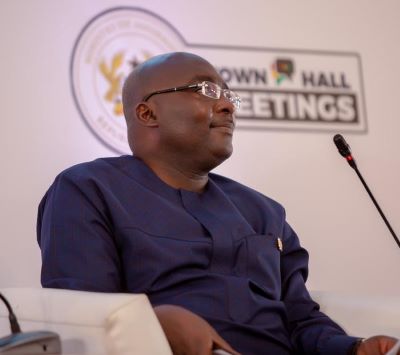n was developed by the Ghana Revenue Authority (GRA) to leverage on technology to facilitate tax payment with convenience intended to increase revenue mobilisation.
It is expected to enhance tax payment compliance, improve the quality of tax returns, provide revenue assurance, keep records electronically, minimise human contact and mistakes as well as improve the country’s ranking on the Ease of Doing Business Index.
The designing of the electronic platform was in response to Vice President Bawumia’s directive to the Management of the GRA in April, last year, to develop a simplified electronic system that would enable taxpayers to file their tax returns using phones or computers at their convenience.
Speaking at the launch of the 2019 Tax and Good Governance Week in Accra, Vice President Bawumia commended the leadership of GRA for their swift response and initiative and encouraged them to come up with more of such ideas to improve the automation processes.
The event, organised by the GRA in collaboration with the Finance Ministry, attracted staff of the GRA, heads of agencies, donor partners and members of the public, which was held on the theme: “File Your Tax Returns, Pay Your Taxes, Move Ghana Beyond Aid” to raise awareness on the need to file tax returns and pay the appropriate taxes.
Vice President Bawumia was encouraged by the strides the GRA was making in designing processes and procedures towards the improvement of tax administration in the country.
“I have also been made aware that very soon GRA will launch an electronic payment platform for operators in the informal sector particularly, commercial transport operators and taxpayers on tax stamp for the small-scale self-employed.
“This is to enable them pay their taxes through mobile money. I am encouraged that GRA is making great strides in re-designing its processes and procedures to improve tax administration,” he noted.
The Vice President said government was fully committed to its goal of moving the economy from one of taxation towards production, saying “This means allowing production and profits first before taxation, but not a complete turn away from taxation”.
The move, he said, would enable the Government to secure enough financial resources to provide social services such as the Free Senior High School, National Health Insurance, road infrastructure, revamping of the railway sector and other legitimate demands of the citizenry.
He, therefore, urged all income earning persons to comply with the tax law by filing their tax returns and paying the appropriate taxes on the due dates.
Currently, only 1.2 million people pay taxes out of the six million economically active populations, with one million being in the formal sector, leaving only 200,000 coming from the informal sector.
Mr Emmanuel Kofi Nti, the Commissioner-General of the GRA, in his welcome address, said the Income Tax Act, 2015, (Act 896) mandated every income earning persons to file their annual tax returns for the previous year by April 30.
He said those who filed their tax returns would claim personal tax reliefs, receive tax refund for overpayment of taxes and receive fair and reasonable tax assessment from the GRA to enable them to receive tax clearance certificates, noting that filing of tax returns was not a matter of choice, but a statutory requirement and those who default would be sanctioned accordingly.
Mr Ken Ofori-Atta, the Finance Minister, said tax revenues constituted 10.8 per cent of the country’s gross domestic product in 2018, and it was therefore prudent for the tax collection agencies to re-double their efforts to move from the GH¢31 billion revenues mobilised in 2016 to the projected amount of GH¢61 billion, this year.
He lauded the efforts of the GRA of increased Taxpayers Identification Number (TIN) registration from one million in 2017 to 2.4 million in 2018 and urged the Authority to improve its education drive to get more people registered.




